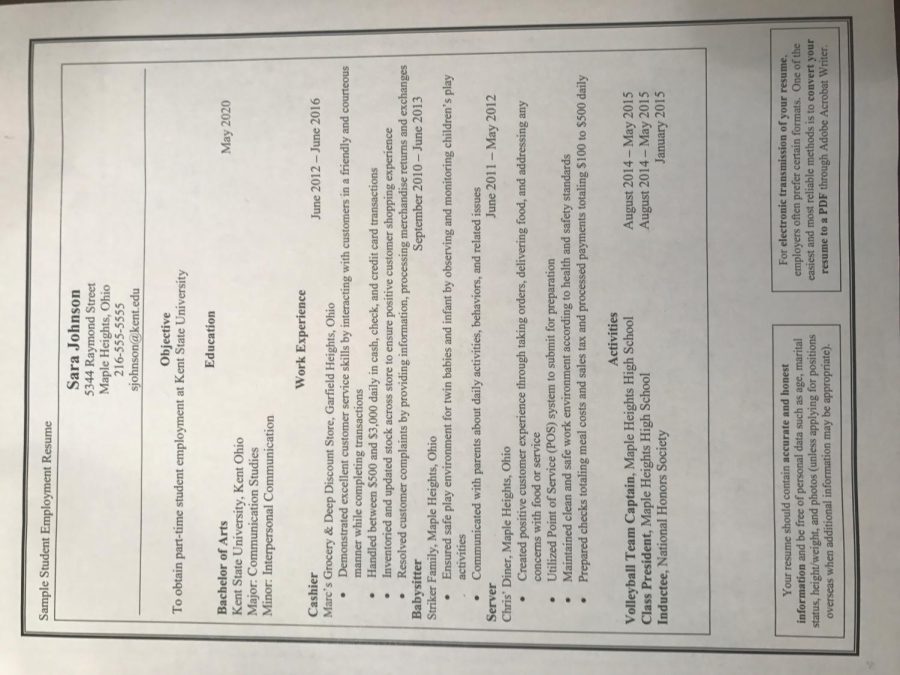Five resume mistakes students should avoid
February 16, 2018
Kent State students can avoid mistakes on their resumes with these five tips provided by Career Services.
Career Services offers many resources including career counseling, workshops, assistance with internships, career fairs and career assessment tools.
Julie Novotny, a Kent State University career adviser, works with students on their resumes during drop-in hours, as well as meeting with current and prospective students, alumni and community members to help shape their careers.
Novotny compiled a list of common mistakes from personal experience that the staff sees most at Career Services.
Mistake #1: Using a template
A template is a document that has been put together for you rather than creating it from scratch; for example, a pre-existing resume document on your computer.
“People think they are easy to use, but they are hard to make changes to,” Novotny said. “Resumes should be unique to experiences and the person. They should never look the same.”
Novotny said most employers will not even look at your resume if they look familiar. Instead, students should use the templates for examples of structure.
At the resume drop-in sessions, students can get a sample resume to use as a guide.
“I’ve used their services a few times,” said Olivia Williams, a senior public relations major. “They helped me put my cover letter and resume together for an internship position I got over the summer.”
Mistake #2: Spelling & Grammar
“The No. 1 reason people stop looking at your resume is because of spelling errors,” Novotny said. “How do we know you care enough about the job if you do not care enough to fix your errors?”
Students often overlook mistakes and do not proofread their resumes. This can cause you to miss out on job opportunities, Novotny said.
Mistake #3: Having too much information
Resumes need to be concise with what is most recent and relevant to that job.
Novotny said Career Services often sees things that are unnecessary and just take up space.
“Sometimes you’ll see entire work history that goes back to their very first job when they were a freshman in high school,” Novotny said. “Putting a babysitting job on your resume may not be relevant to a position now.”
You want to keep it as short as possible, elaborating on certain details. Employers have very little time to read, especially paragraphs, Novotny said.
In an eye-tracking study done by TheLadders, it was found that recruiters spend only six seconds reviewing an individual resume.
Your name, education, the current company you work for, your previous employment, the start and end dates of your previous position and the start and end dates of your current position are the most important aspects, according to the study.
“You don’t want large paragraphs of information, and we don’t want just a list of work history,” Novotny said. “Make it unique.”
Mistake #4: Resume and cover letter structure
According to thebalance.com, a cover letter is a document sent with your resume to provide additional information on your skills and experience.
The letter should be in a business format, starting with a header, salutation, body paragraph, and lastly a closing statement and a signature, according on the article.
“You want to customize your experience to the job,” Novotny said. “Explain your work history and qualifications here that are tailored to the position.”
Mistake #5: Naming your degree wrong
“This is a very common mistake we see made amongst the students,” Novotny said. “Degree does not equate to major or college, meaning they are not the same and should not be used in the same.”
For instance, art majors say they have a degree in the “Bachelors of Arts and Sciences” when it is just a Bachelors of the Arts, Novotny said.
In your education section, there should be a list with the degree, institutions, city and state, major and any concentrations or minors.
“These are really common mistakes, and (it) gives off the impression that you are not competent for the job because you are not even familiar with how to write your degree,” Novotny said.
Novotny says these mistakes can be fixed through proofreading and the resources at Career Services. She also said anyone can stop in for help.
Career Services at the Schwartz Center provides two-hour drop-in hours five days a week to help students critique their resumes and cover letters.
Imani Fields is the jobs reporter. Contact her at [email protected].

























